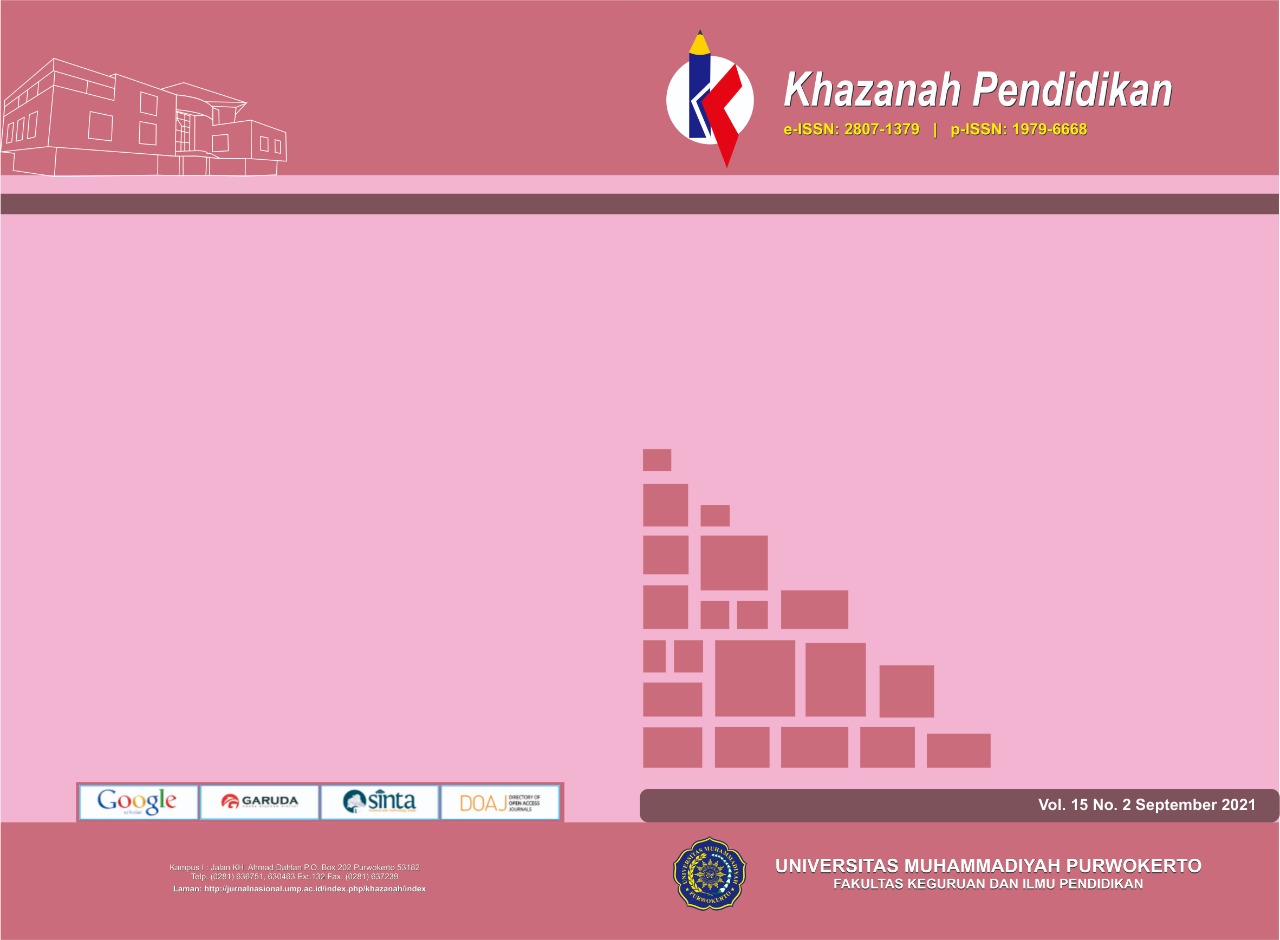ANALISIS HAMBATAN GURU DALAM PENGIMPLEMENTASIAN PEMBELAJARAN TEMATIK DI ERA PANDEMI COVID19
DOI:
https://doi.org/10.30595/jkp.v15i2.9869Abstract
Â
This study aims to determine teacher barriers in thematic learning in the era of the Covid19 pandemic.
This research was conducted in Soroyudan Public Elementary School, Tegalrejo district, Magelang regency. This research was conducted using data collection methods in the form of interviews conducted with principal, teachers, and students, observations to teachers and students, as well as examining some supporting documents. This research uses a qualitative approach to the type of case study. Test the validity of the data using triangulation techniques. Triangulation used is source triangulation, techciques triangulation and time triangulation.
The results of this study were obtained analysis of teacher barriers in thematic learning in the era covid19 pandemic. The barriers in the initial activity was low internet network access, there are 16,9% of student who do not have smartphone, and there are 9% of parents who cannot use smartphone. The barriers in the core activity was low internet network access, there are 16,9% of student who do not have smartphone, there are 9% of parents who cannot use smartphone and limitations of the learning method used by teacher. Barriers in the final activity was low internet network access, there are 16,9% of student who do not have smartphone, and there are 9% of parents who cannot use smartphone
Keywords: Teacher Barriers, Thematic Learning, Covid19 Pandemic
References
Arifin, Zainal. 2014. Penelitian Pendidikan: Metode dan Paradigma Baru. Bandung: PT Remaja Rosdakarya.
Arikunto. 2010. Manajemen Penelitian . Jakarta : Rineka Cipta.
Asriati. 2018. "Pengaruh Pembelajaran Diskusi Kelompok Terhadap Hasil Belajar Siswa." Jurnal Ilmu Pendidikan Sosial, Sains, dan Humaniora 4 No 2: 287-292.
Cahyati, Nika, and Rita Kusumah. 2020. "Peran Orang Tua Dalam Menerapkan Pembelajaran Di Rumah Saat Pandemi Covid 19." Jurnal Golden Age, Universitas Hamzanwadi 152-159.
Djamarah, Syaeful Bahri. 2005. Guru dan Anak Didik dalam Interaksi Anak Didik. Jakarta: Rineka Cipta.
Gafur, Abdul. 2012. Desain Pembelajaran. Yogyakarta: Ombak.
Hasan, M Iqbal. 2002. Pokok-Pokok Materi Metodologi Penelitian dan Aplikasinya. Bogor: Ghalia Indonesia.
Majid, Abdul. 2014. Strategi Pembelajaran. Bandung: PT Remaja Rosdakarya.
Moleong, Lexy J. 2007. Metodologi Penelitian Kualitatif . Bandung : PT Remaja Rosdakarya.
Nasution, Mardiah Kalsum. 2017. "Penggunaan Metode Pembelajaran Dalam Peningkatan Hasil Belajar Siswa." Jurnal Ilmiah Bidang Pendidikan 9-16.
Prastowo, Andi. 2013. Panduan Kreatif Membuat Bahan Ajar Inovatif. Yogyakarta: Diva Press.
Putriana, Suci. 2013. "Pengaruh Belajar Kelompok dan Motivasi Belajar Siswa Terhadap Prestasi Belajar Siswa Kelas VIII SMP Negeri 23 Purworejo." OIKONOMIA 2 (4): 325-330.
Rusman. 2012. Model-Model Pembelajaran. Depok: PT Raja Grafindo Persada.
Sama., Syaiful Bahri., & Fajar Budiyono. 2020. "Sinergitas Guru dan Orang Tua dalam Pembelajaran Daring Pada Masa Covid-19 di Kecamatan Kalianget." Prosiding Diskusi Daring Tematik Nasional 2020 62-66.
Setiawan, Adib Rifqi. 2020. "Lembar Kegiatan Literasi Saintifik untuk Pembelajaran Jarak Jauh Topik Penyakit Coronavirus 2019 (COVID-19)." Jurnal Ilmu Pendidikan 29.
Sugiarto. 2017. Metodologi Penelitian Bisnis. Yogyakarta: Andi.
Sugiyono. 2013. Metode Penelitian Kuantitatif Kualitatif dan R&D. Jakarta: Rineka Cipta.
Sukardi. 2013. Metodologi Penelitian Pendidikan: Kompetensi dan Praktiknya. Jakarta: Bumi Aksara.
Sukmadinata, Nana Syaodih. 2007. Metode Penelitian Pendidikan. Bandung: Rosdakarya.
Trianto. 2011. Model Pembelajaran Terpadu Konsep Strategi dan Implementasinya Dalam Kurikulum Tingkat Satuan Pendidikan. Jakarta: Bumi Aksara.
Wahidmurni. 2017. Metodologi Pembelajaran IPS. Jakarta: Ar-ruzz Media.
Yusuf, Muri. 2014. Metode Penelitian Kuantitatif, Kualitatif & Penelitian Gabungan. Jakarta: Prenadamedia Group.
Downloads
Published
Issue
Section
License
Authors who publish with this journal agree to the following terms:
Authors retain copyright and grant the journal right of first publication with the work simultaneously licensed under a Creative Commons Attribution License that allows others to share the work with an acknowledgement of the work's authorship and initial publication in this journal.
Authors are able to enter into separate, additional contractual arrangements for the non-exclusive distribution of the journal's published version of the work (e.g., post it to an institutional repository or publish it in a book), with an acknowledgement of its initial publication in this journal.
Authors are permitted and encouraged to post their work online (e.g., in institutional repositories or on their website) prior to and during the submission process, as it can lead to productive exchanges, as well as earlier and greater citation of published work (See The Effect of Open Access).

Khazanah Pendidikan is licensed under a Creative Commons Attribution 4.0 International License.


